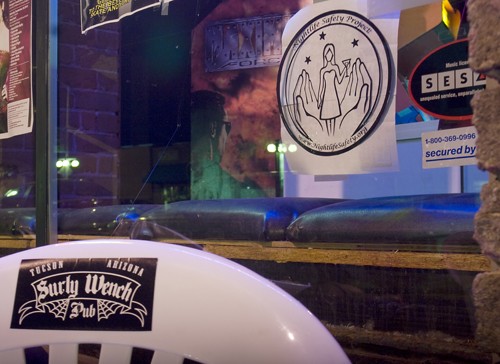Many women think being harassed at bars comes with the territory.
The Nightlife Safety Project, a program through the Southern Arizona Center Against Sexual Assault, is recruiting Tucson bars to take a zero-tolerance stance against harassment.
“”Sexual aggression predicts sexual assault,”” said Rowan Frost, project supervisor for the Southern Arizona Center Against Sexual Assault. “”You need to look at the social norms that promote the behavior.””
Frost said she thought up the program after hearing from a friend who worked at a gay bar where 60 percent of the clientele were straight women.
“”Why do straight women go to gay bars?”” Frost said. “”So they won’t be harassed.””
Program developers surveyed a small group of women and found 88 percent of women had experienced unwanted sexual aggression at bars and 44 percent experienced physical aggression, according to Frost.
The definition of harassment varies from person to person, according to Erin Strange, the violence prevention specialist for the UA Oasis Program Against Sexual Assault.
“”I think we all need to be very aware of where our boundaries are at,”” Strange said. “”If your inner-voice is telling you something doesn’t feel right, say something.””
Music composition senior Lori Richardson said she experienced harassment while at a bar.
“”It was in L.A., and the bartender didn’t know how to handle it,”” Richardson said.
“”It was a guy from Ireland. It was just making me mad how he kept insinuating going home with him. He put his hand on my leg.””
Richardson said the bartender eventually stepped in to ask if she was uncomfortable.
Frost said the Nightlife Safety Program is geared toward women ages 21 to 24 who have recently entered the bar scene. According to Frost, these women may not be able to tell men to “”buzz off”” as easily as older women.
Participating bars first adopted a zero-tolerance policy toward sexual aggression; next, program coordinators led a one-hour training session for bar staff.
The training session teaches staff how to handle sexual aggression. Frost said many bartenders and bouncers are aware of problems, but do not know when to step in.
The program asks bar staff to interfere if there is an obvious problem.
“”And also give women a chance to solve the problem on their own,”” Frost said.
Richardson said she goes to bars on Fourth Avenue and thinks the program will be beneficial.
“”But then again, if you’re a girl going to a bar you should expect it, and you need to be careful,”” Richardson said.
Andrew Ryan, an employee at the Sky Bar on Fourth Avenue, said the bar joined the Nightlife Safety Project “”without hesitation.””
“”It was a no-brainer thing to do,”” Ryan said.
Ryan said the program will show customers the bar is a safe space.
“”I’d say we were already pretty aware,”” Ryan said. “”This is a nice thing to make it official and make sure patrons know we’ve done this.””
The program is advertised with a sign on the sidewalk and a plaque inside the bar. Ryan said the bar staff will also verbally convey the zero-tolerance stance to customers.
Strange said the presence of the program may make women more comfortable reporting problems.
“”Maybe some women wouldn’t have thought of that before,”” Strange said. Frost has recruited five bars for the program so far and hopes to add more. She said coffee shops have also approached her about participation.
“”I love the idea of it becoming a community project,”” Frost said.









